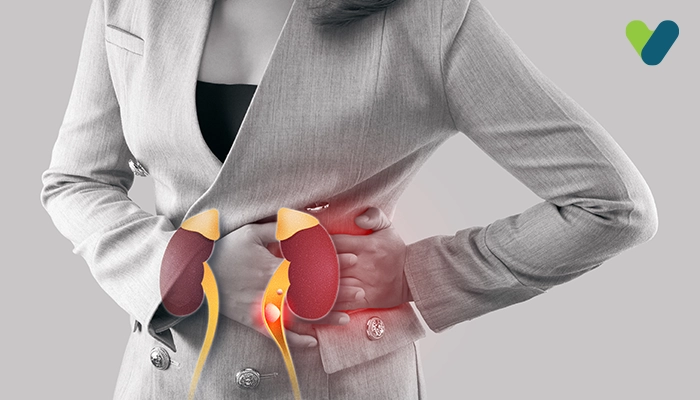One fine morning Rahul woke up with a sharp pain on the side of his tummy near the abdomen. Confused and scared, he went to the doctor. Rahul wondered what on earth could happen to a fit man like him. After a thorough examination, the doctor informed Rahul that he was suffering from kidney stones. For further investigation, diagnosis, and treatment, Rahul has to undergo another test of ultrasound which his doctor prescribed. Rahul was clueless about his kidney stones and thought to himself, why ultrasound?
Are you someone who has heard of ultrasound in kidney stones for the first time? This blog will help you understand both and why ultrasound in kidney stones is needed.
What Are Kidney Stones?
Kidney stones called calculi nephrolithiasis or urolithiasis are crystallised forms of insoluble calcium compounds and renal calculus, which deposits in your kidney when the urine becomes concentrated.Passing them out can be painful. They cause no damage if treated in time. All you’ll need is pain medicines and lots of water to pass them out. In some cases, like when a stone embeds itself in the urinary tract, then surgery might be needed.
To detect them, an ultrasound on kidney stones is done.
Purpose of an Ultrasound for Kidney Stones
Ultrasound in kidney stones is done to procure images of the kidney. It is a non-invasive diagnostic exam. One can see the size, shape, and location of the kidney in the procured pictures. One can even assess the blood flow of the kidney using ultrasound.It is done using a transducer that sends out high-frequency ultrasound waves that the human ears can’t hear. The transducer is placed on the skin so that the ultrasound waves can travel in the body to the organs. When the sound wave hits the organ, it bounces off like an echo and travels back to the transducer. The transducer processes these reflected waves are processed by the transducer, which is then converted into an image by the computer. This image shows the examined organs and tissues.
These ultrasound waves travel at different speeds for different tissues. They travel fastest through the bone tissues and slowest through the air.
A get is put of the transducer and the skin to move smoothly without much friction. This gel is also used to eliminate air that is present between the skin and the transducer. This helps in the best sound conduction for ultrasound in kidney stones.
Doppler ultrasound or duplex study is another kind of ultrasound used for ultrasound in kidney stones. One difference between a regular ultrasound and a doppler ultrasound is that ultrasound waves are inaudible in the former, and in the latter, it is sometimes audible.
Hence, kidney stones or calculi of the kidney and the ureters are identified using ultrasound waves. The size and placement of the stone are known after the image is produced by the computer.
X-ray, CT scan, kidney scan, kidney angiogram, etc., are some other procedures performed to evaluate the kidney.
Preparation for a Kidney Ultrasound
- You should drink a minimum of 700 to 800 ml or 24 ounces of water. You should drink it at least an hour before your session. Keep in mind to not empty your bladder before the appointment. This will help in ultrasound in kidney stones as the clear water will ease the process of it. No fasting or sedation is required before ultrasound in kidney stones.
- Don’t stress much, as your doctor will explain the whole procedure thoroughly before the session. If you have any doubts or queries, you can ask your doctor before the ultrasound session.
- At some facilities, you may have to sign a no-objection form or a kind of consent form that will state that you are willingly undergoing the ultrasound process. In case of any damage or harm to health, the doctor of the facility staff will not be held responsible. It is essential to read the form carefully and ask every doubt if you have any.
- Based on the results of the first session or your medical condition, the doctor may request another session of ultrasound.


